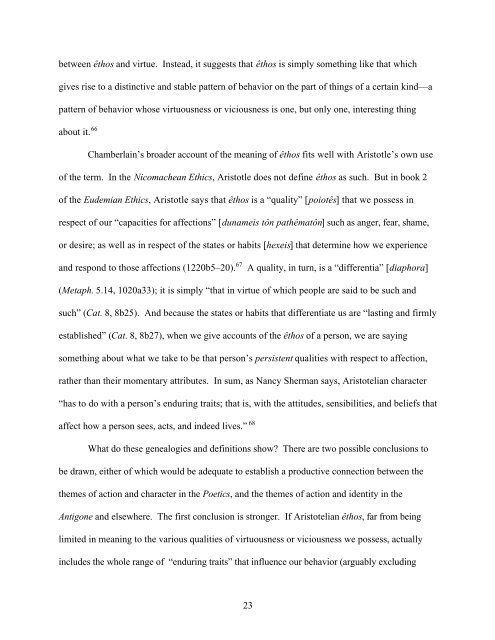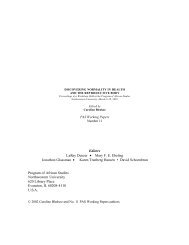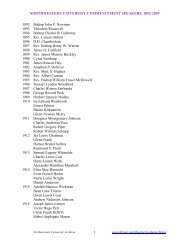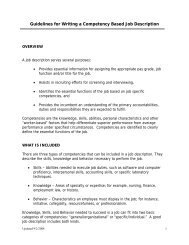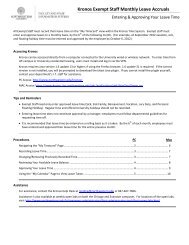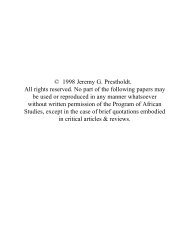TRAGIC RECOGNITION: ACTION AND IDENTITY IN ANTIGONE ...
TRAGIC RECOGNITION: ACTION AND IDENTITY IN ANTIGONE ...
TRAGIC RECOGNITION: ACTION AND IDENTITY IN ANTIGONE ...
Create successful ePaper yourself
Turn your PDF publications into a flip-book with our unique Google optimized e-Paper software.
etween êthos and virtue. Instead, it suggests that êthos is simply something like that which<br />
gives rise to a distinctive and stable pattern of behavior on the part of things of a certain kind—a<br />
pattern of behavior whose virtuousness or viciousness is one, but only one, interesting thing<br />
about it. 66<br />
Chamberlain’s broader account of the meaning of êthos fits well with Aristotle’s own use<br />
of the term. In the Nicomachean Ethics, Aristotle does not define êthos as such. But in book 2<br />
of the Eudemian Ethics, Aristotle says that êthos is a “quality” [poiotês] that we possess in<br />
respect of our “capacities for affections” [dunameis tôn pathêmatôn] such as anger, fear, shame,<br />
or desire; as well as in respect of the states or habits [hexeis] that determine how we experience<br />
and respond to those affections (1220b5–20). 67 A quality, in turn, is a “differentia” [diaphora]<br />
(Metaph. 5.14, 1020a33); it is simply “that in virtue of which people are said to be such and<br />
such” (Cat. 8, 8b25). And because the states or habits that differentiate us are “lasting and firmly<br />
established” (Cat. 8, 8b27), when we give accounts of the êthos of a person, we are saying<br />
something about what we take to be that person’s persistent qualities with respect to affection,<br />
rather than their momentary attributes. In sum, as Nancy Sherman says, Aristotelian character<br />
“has to do with a person’s enduring traits; that is, with the attitudes, sensibilities, and beliefs that<br />
affect how a person sees, acts, and indeed lives.” 68<br />
What do these genealogies and definitions show? There are two possible conclusions to<br />
be drawn, either of which would be adequate to establish a productive connection between the<br />
themes of action and character in the Poetics, and the themes of action and identity in the<br />
Antigone and elsewhere. The first conclusion is stronger. If Aristotelian êthos, far from being<br />
limited in meaning to the various qualities of virtuousness or viciousness we possess, actually<br />
includes the whole range of “enduring traits” that influence our behavior (arguably excluding<br />
23


